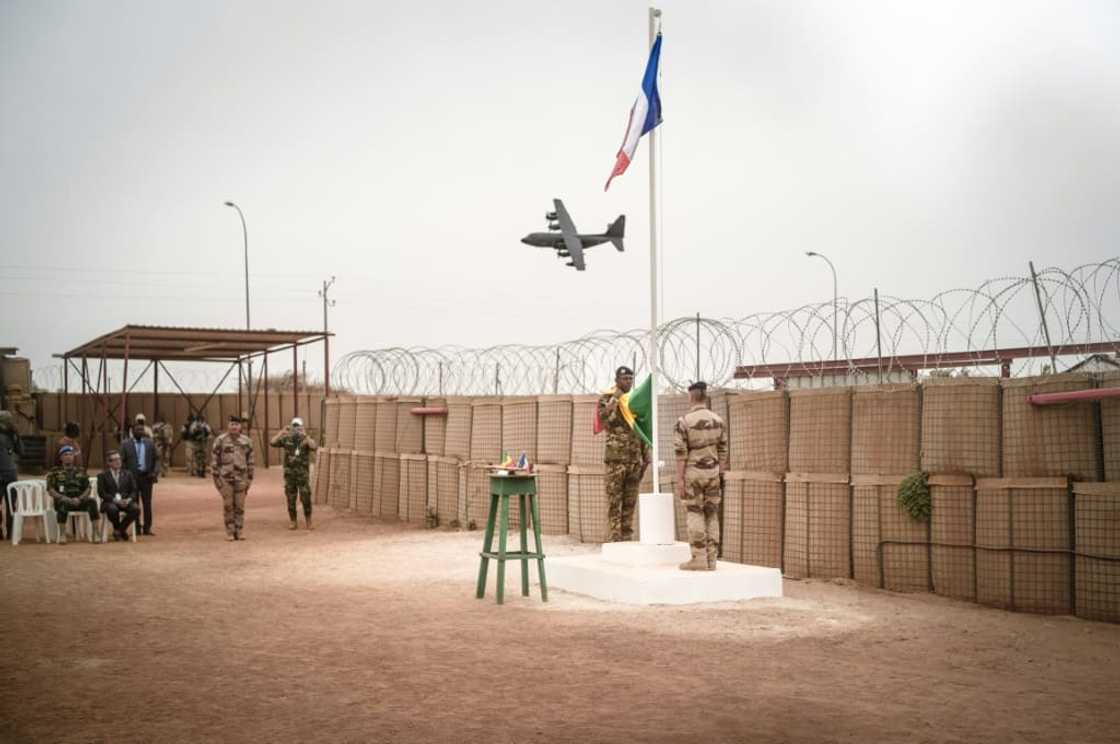French force in Sahel leaves Mali in vast operation

Source: AFP
New feature: Check out news exactly for YOU ➡️ find “Recommended for you” block and enjoy!
The main French military base in Niger has become a hub of frantic activity for troops and equipment leaving neighbouring Mali.
After nine years fighting jihadists in Mali, France is pulling its troops out of the country after falling out with its military junta, and reducing its presence in the wider Sahel region.
"This disengagement from Mali is the biggest of our missions," says Colonel Hubert Baudoin, the the deputy chief of the French anti-jihadist mission in the Sahel, Operation Barkhane.
Commander Thierry, coordinator of logistical movements across the zone, agrees: "It's a gigantic maneouvre."
Every day, two to three air convoys travel from a base in Gao, Mali, to the one in Niger's capital Niamey. Two to three road convoys also make the trip each week between the cities almost 500 kilometres (around 300 miles) apart.
After ties ruptured between Paris and the junta that took power in Mali in August 2020, the French began to withdraw in February.
PAY ATTENTION: Click “See First” under the “Following” tab to see Briefly News on your News Feed!
After Gossi and Menaka, the troops are due out of Gao by summer's end.
Dozing legionnaires
At the Niamey base, forklifts shuffle around pallets, while armoured vehicles sit lined up as far as the eye can see.
In all, France must fly home 1,000 vehicles and some 4,000 containers.
Colonel Laurent Grebil, logistics manager for Operation Barkhane, has already overseen a departure from a military theatre, 10 years ago in northeast Afghanistan. But that was on a much smaller scale, he says.
"Here the complexity of the maneouvre arises from the distances to be covered and the volume of equipment and men to get out in a limited time," he says.
"It will take a little less than a year to bring everything back to France."
At the Niamey military airport, the forklifts handle all kinds of goods, from camp beds to spare parts and electrical equipment, including fridges.
Along the dusty road that crosses the base, French legionnaires doze under khaki tarpaulins hitched up between two armoured vehicles, after arriving a day earlier from escorting several dozen civilian vehicles from Gao.
They must head back during the night, keeping to the tight deadlines imposed by the French presidency.
Last jihadist strike?
The road connecting Niamey and Gao crosses semi-desert territory known as the "tri-border area" where the frontiers of Niger, Mali and Burkina converge. It is reputed to serve as a refuge for jihadists linked to the Islamic State group.
There, "armed terrorist groups have been avoiding Barkhane for several months. But we remain on our guard," says the French force's deputy chief of operations.
Lieutenant-Colonel Eric, of the intelligence unit, warns that a last jihadist strike could take place as a show of strength.
"With France leaving, a real security vacuum will be created. Everyone will try to occupy the space, and one of the ways of occupying at least the perceived space would be to deal us a blow.
"The disengagement phase is always the most dangerous," he says, speaking on condition his second name be withheld.
The withdrawal comes amid a surge of violence in the Sahel.
More than 2,000 civilians have been killed in Mali, Niger and Burkina Faso since the start of the year, already more than the 2,021 recorded for the whole of 2021, according to an AFP tally of the findings of non-governmental organisation ACLED.
Rainy season
On the scorched tarmac, two Mirage 2000 fighter jets armed with guided bombs rev up their engines, ready to take off.
"We're going to support a convoy on the part of the road identified as the most at risk. The noise of the planes tends to deter armed groups," explains Lieutenant-Colonel Pierre-Henri, commander of the hunting detachment.
The base also has six armed drones to ensure the safety of convoys.
But the rainy season is now complicating matters.
"Rain can ground planes and blind drones," depriving convoys of their guardian angels, says Lieutenant-Colonel Samir, head of the joint operations centre for Barkhane in N'Djamena, Chad.
And "unlike military vehicles, civilian trucks... can't leave the tarred roads" or they risk getting stuck.
After the massive withdrawal, only 2,500 soldiers will be maintained in the Sahel, compared with more than 5,000 two years ago.
France will keep more than 1,000 men in Niger, where a tactical group will continue to work in partnership with the Nigerien forces.
But the strain it has placed on the Niamey base will not last, says its commander, Colonel Loic Mandereau.
"This base is not intended to grow. We are not transferring Gao to Niamey," he says.
New feature: check out news exactly for YOU ➡️ find "Recommended for you" block and enjoy!
Source: AFP

